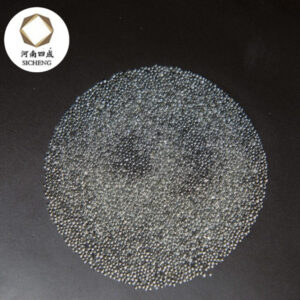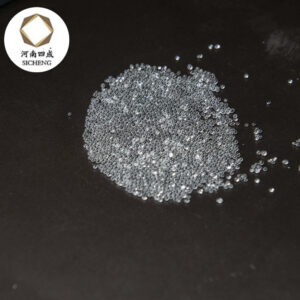Glass beads are commonly used for grinding and milling applications, particularly in industries like paints, inks, cosmetics, pharmaceuticals, and electronics. Here’s why they are effective:
1. Hardness & Durability
Glass beads are made from high-quality borosilicate or soda-lime glass, giving them excellent hardness (around 5–6 Mohs scale).
They resist wear and fragmentation, maintaining their shape even under high-speed grinding.
2. Smooth & Spherical Shape
Their round shape ensures uniform grinding with minimal clogging or agglomeration.
The smooth surface reduces friction and wear on equipment while ensuring consistent particle size reduction.
3. Chemical Inertness
Glass is non-reactive, making it ideal for grinding sensitive materials (e.g., pharmaceuticals, food, or pigments) without contamination.
Unlike metal beads, they don’t oxidize or introduce metallic impurities.
4. Density & Impact Force
Glass beads have a moderate density (~2.5 g/cm³), which provides sufficient impact force for fine grinding without excessive energy consumption.
Ideal for wet milling (e.g., in bead mills) where they efficiently disperse and break down particles.
5. Size Variety & Precision Grinding
Available in sizes from 0.1 mm to 3 mm, allowing for ultra-fine grinding (nanoparticle production) or coarser milling.
Smaller beads provide higher shear forces, ideal for breaking down agglomerates.
6. Cost-Effective & Reusable
Cheaper than zirconia or ceramic beads but still effective for many applications.
Can be cleaned and reused if not excessively worn.
Common Applications:
Paints & Inks (dispersion of pigments)
Cosmetics (homogenizing creams & lotions)
Pharmaceuticals (nanoparticle drug delivery)
Electronics (ceramic slurry preparation)
Limitations:
Not as hard as zirconia or ceramic beads, so they may wear faster in extremely high-energy milling.
Not suitable for extremely abrasive materials where harder media (like yttria-stabilized zirconia) are needed.
Conclusion:
Glass beads are a versatile, cost-effective grinding medium for fine and ultra-fine milling, especially where chemical purity and smooth processing are critical. For tougher materials, ceramic or zirconia beads may be preferred.



